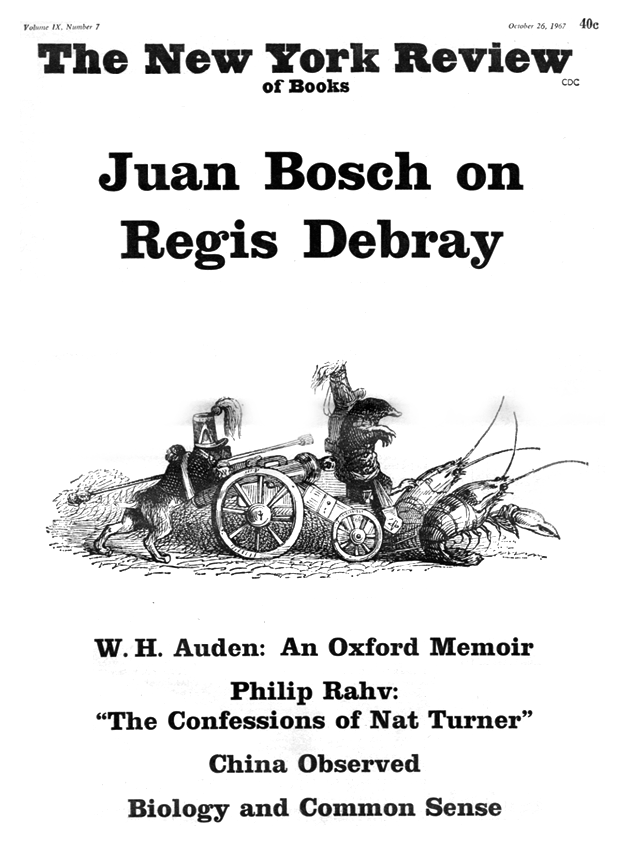In response to:
They'd Rather Be Left from the September 28, 1967 issue
To the Editors:
Andrew Kopkind’s article was fascinating and deeply disturbing, as I am sure it was meant to be. His conclusion as to the futility of all organized Negro political groups and leaders, from King to Carmichael, seems to be borne out by the riots, and his snide reflections on the purposes of King’s book, which “sounds as if it were intended to be read aloud in suburban synagogues and ADA chapter meetings” possibly accurate—at the moment.
But where would Kopkind have us move? He himself seems undecided and self-contradictory. For after giving out with a half-mystical and half-hippie adoration of a sort of blind, instinctual rage: “the radical funkiness of black America” and “The name of the game is chaos,” he turns about to suggest that a new form of organization is, after all, not only desirable but necessary. “The point now is to extend democracy radically, and that task will involve whites as well as blacks.” He tells us that the street fighters (who presumably have repudiated King, SNCC, CORE, and the “suburban synagogues”) “need to have a new coalition behind them to absorb the inevitable calls for repression.”
Having just finished depositing the entire existing civil rights and liberal movement in the ashcan of history, where does Mr. Kopkind propose to find that new coalition? Among the Maoists? In Cuba? On the moon? It is all very well to tell us that “morality starts at the barrel of a gun.” But who has the guns now? And are those who possess the biggest bang ever really able to chance anything? What have guns accomplished in Vietnam?
By tearing apart all those who work for justice—except if they participate in guerrilla fighting in the streets—and then issuing an empty call for a “new coalition,” Mr. Kopkind throws a smoke bomb into the midst of those who work for and believe in such a coalition. The time is not for hip glorification of “funkiness” and blind anger, but for greater understanding and communion among all those—white and black—who despise racism and work for its elimination.
Elie Siegmeister
Great Neck, N.Y.
Andrew Kopkind replies:
Do you mean morality doesn’t grow out of the barrel of a gun? Mr. Coser and the other correspondents may have new information on the eternal verities, but my own sources are not so good. It seems to me that notions of morality, as of politics and everything else, grow out of existing institutional relationships—that is, how power is organized in a society. To change the values you change the organization. That is the only valid kind of “moral suasion.” It is not so easy to get off the hook by proclaiming dedication to “work for justice.” There is also a responsibility to “name the system, analyze it, and change it,” as Paul Potter put it. Despite undoubted contributions in the early years of the movement, Martin King has neither named the system nor analyzed it. He now has no hope of changing it.
I cannot see how that is fascistic: in fact, the opposite position (though part of the rhetoric of liberalism) seems to be much more so—the one that leads to a separation of “morality” and “pragmatism.” Someone said to me recently that he was “morally” opposed to the war, of course, but that he preferred to consider policy alternatives on the basis of pragmatic standards (whatever they are). In Newark and Detroit as in Quang Tri province, the moral and pragmatic modes are inseparable. To “work for justice” and not to recognize the realities of power—who are the invaders, who the oppressors—is a colossal liberal cop-out. It would be nice to have, as Elie Siegmeister recommends, “understanding and communion among all those…who despise racism and work for its elimination,” but alas we do not, and to pretend that it is imminent is neither helpful nor moral, in anyone’s terms.
I wish I had a strategy and could tell such readers where to move, but I do not. On the one hand, it is fairly clear what is irrelevant: all the existing “solutions” of understanding, communion, and that sort of thing. The overwhelming fact is that the politics does not exist in the US now for a solution of any kind. The important job, then, is to change politics, and there are people who are beginning to work in that direction. That primitive method—it is not yet a strategy—involves intensive radical organization on a local level, disruption of power structures, and the internationalization of the movement. In other words, it means working for a redistribution of power, by organizing a threat to those in whose hands power is now concentrated. It may focus on taking over a school in a ghetto, or winning a local city council election, or making it impossible for Lyndon Johnson to campaign in big cities. It will mean the increasing identification of the American movement with anti-imperialist movements in the “third world.” No one claims that the fight will be quick or easy. It will last the lifetime of all of those now in the movement, and “success” will depend on the evolution and interaction of forces just now developing.
This Issue
October 26, 1967


